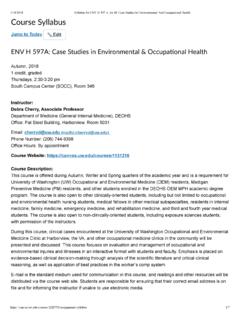Transcription of Impact Factor 3.582 Case Studies Journal ISSN (2305-509X ...
1 Impact Factor case Studies Journal ISSN (2305-509X) Volume 7, Issue 10 Oct-2018 Page 70 Skills of Nurses Regarding Oral Health Care Provision to Patients in Pediatric Intensive Care Units: A Nurses Perspective Author s Details: Tahira Khatoon1, Anum Fatima*2, Hizbullah Khan, Ayyazda Farhana, Tabassam Zia, Tahira Yasmine (1)Nursing Superintendent, Government Nawaz Sharif Teaching Hospital, Lahore-(2)Associate Professor, Principal Institute of Nursing Wah Medical College, Wah Cantt-(3)Assistant Professor Nursing, Bacha Khan Medical College, Mardan-(4)Head Nurse, Government Nawaz Sharif Teaching Hospital, Lahore (5)Head Nurse, School of Nursing, Services Hospital, Lahore-(6)Nursing Instructor, School of Nursing, Services Hospital, Lahore Corresponding Author*;Ms. Anum Fatima, Principal/ Head of Department, Institute of Nursing Wah Medical College, Wah Cantt Abstract: Introduction: Oral health is known as, an important part of the overall health of every person but it may not be provided as it is needed for hospitalized children worldwide.
2 Oral hygiene done by a nurse is not appropriate especially, in a patient who is semiconscious and non-cooperating. Objectives: Assess the skills among nurses regarding the provision of oral health care to patients in Pediatric Intensive Care Methodology: The cross- sectional descriptive Survey approach was used. This study was conducted in three Government hospitals from Lahore. 100 nurses participated from different PICU. Non-probability purposive sampling technique was used. Findings and Discussion: The result of the observation made by a researcher also showed that majority of the nurses were providing care to the intubated patients once or two times per shift but oral care for non-intubated patients was not taken as a priority by nurses working in PICU.
3 The second Factor was non availability of oral care applicators and solutions in these particular areas. That may create a hindrance in providing standardized oral care in seriously ill children as for nursing skill in oral care that was observed by researcher in PICU; result showed that nurses were not paying attention to this critical issue because of not having any guideline regarding oral care and be unaware of the oral complication that may arise as a result of neglected oral. Conclusion: the standardized oral hygiene has considerable contribution to improve oral care practice of nurses working in intensive care units hence be organized with better information and practice recommendation. This shortcoming of nurse s practices can be improved through short courses. It was also observed that there was the absence of the guideline/protocol.
4 Therefore, there is the need of the hour to develop the protocol/guideline for nurses to advance the nurses practice Key Words: Pediatric Intensive Care Units, Oral hygiene, skills, guideline/protocol. Introduction: Oral health is known as, an important part of the overall health of every person but it may not be provided as it is needed for hospitalized children oral care itself is considered one of the major risk Factor for oral infection such as candidiasis, bacteremia, and septicemia. Particularly, immunosuppressive drugs taking patients such as corticosteroids, methotrexate, or When the patient is on an EndoTracheal Tube (ETT), defenses mechanism of the patient against pneumonia is impaired. ETT serves as a foreign body and pressures on cuff may damage the tracheal wall, potentially cause of long-term In intensive care, patient s salivary flow is severely declining and result in xerostomia (dry mouth).
5 4 and later in Mucositis (oral inflammation).5 A number of studies6,7,8,9 advocated that oral care help to minimize the colonization of dental plaque and also in the prevention of Ventilator Associated Pneumonia (VAP). Consistent, regular and standardized oral hygiene practices in the PICU will also set a model for children and their parents motivating and teaching them about the lifetime significance of oral It is the responsibility of nurses to clean the oral cavity of intubated and non intubated patients with a toothbrush or sponge-tipped swab and use saline solution, mouthwash or chlorhexidine as cleansing agents on daily bases. The patient's airway must be secure to prevent aspiration, and endotracheal tube must be stabilized, and ETT tape should be changed if it is loose or contaminated in intubated patients.
6 Lubricants should be applied to the lips. This important nursing task is Impact Factor case Studies Journal ISSN (2305-509X) Volume 7, Issue 10 Oct-2018 Page 71 neglected or overlooked by most of the nurses because of being occupied in other nursing activities and lack of Literature Review: Oral hygiene done by a nurse is not appropriate especially, in a patient who is semiconscious and non-cooperating. The purpose of oral care is to improve oral health that helps in reducing the oropharynx colonization and dental plaque by bacteria and aspiration of saliva. However, oral care is often ignored or performed inefficiently in critically ill patients. The patient s oral cavity is swabbed only for comfort. Frequency and type of oral care provided to critically ill patients may upgrade of nursing interventions that may get better outcomes in these patients.
7 Nurses current oral care practice is not evidence based and improperly defined. A study of critical care nurses and other research indicated that in the absence of evidence-based practice strategy, nurses provide multiple oral care interventions to address patient s comfort. ICU nurses may be cautious for oral care to those patients who are ventilated because endotracheal tubes may limit access to the oral cavity. Oral care may be affected by the opinion of nurses that it is less contributory to the patient s health and welfare (or less significance) than are other nursing interventions. In a study by Furr et al. (2002) investigated hospital factors that directly affected the quality of oral care in hospitals. Which included hospital policy regarding oral care, hospital supplies, nurses education in oral health, not having enough time for oral care, not giving importance to oral care and not perceiving oral care as an unpleasant task.
8 A study conducted in Malaysia by Kim et al. (2012) provided insight into oral hygiene practices in Malaysian intensive care units. Results showed that oral hygiene is an everyday practice of nurses in the hospital; however, nature and rate of oral care practices varied among nurses in ICUs that indicates a standardized oral care practice is to be needed, including the use of tooth brushing and chlorhexidine mouthwash. There are also required evidence-based practices that facilitate to improve patient s outcome. Griffiths et al. (2000) supported that oral care is a necessary part of patient health care. An appropriate oral care plan according to each person needs should be developed. Certain factors should be taken into consideration, such as the patient s overall health, medical condition, and prognosis, medications and therapeutics regime as well as the previous standard of oral hygiene and oral care skills.
9 Cindy (2004) stated that current oral care practices by nurses are poorly defined and inconsistent and not evidence based. A study by Nancy et al. (2012) pointed out that in critical care units, patients who are uncooperative, have a high risk for aspiration or on a ventilator can be a real challenge to healthcare members. However, precise and accurate oral care measures and enough evidence are needed to prevent oral health complication. An efficient oral care plan can reduce the incidence of pneumonia in serious patients. So nurses should be given higher priority to oral care working in the intensive care unit. In the absence of evidence-based practice guideline in Pakistan, oral care is still badly unobserved, and nurses are not given the priorities to provide oral care to their patients.
10 Objectives: Assess the skills among nurses regarding the provision of oral health care to patients in Pediatric Intensive Care Units. Research Question: This study aims to answer the following questions: Is skill among nurses regarding the provision of oral health care meeting the standard? Impact Factor case Studies Journal ISSN (2305-509X) Volume 7, Issue 10 Oct-2018 Page 72 Is there any guideline/standard protocol related to oral health care existing in PICU? Are nurses working in PICU using the existing guideline for the provision of oral care to patients? Hypothesis: A skill among nurses regarding the provision of oral health care to patients in pediatric intensive care units is not meeting the standards. Research Methodology: A cross- sectional descriptive Survey approach was carried out to conduct the study.










